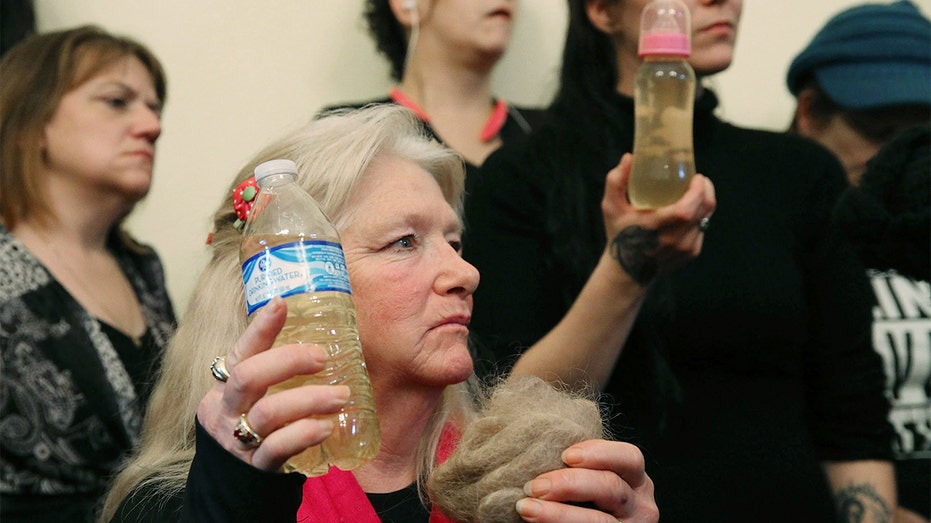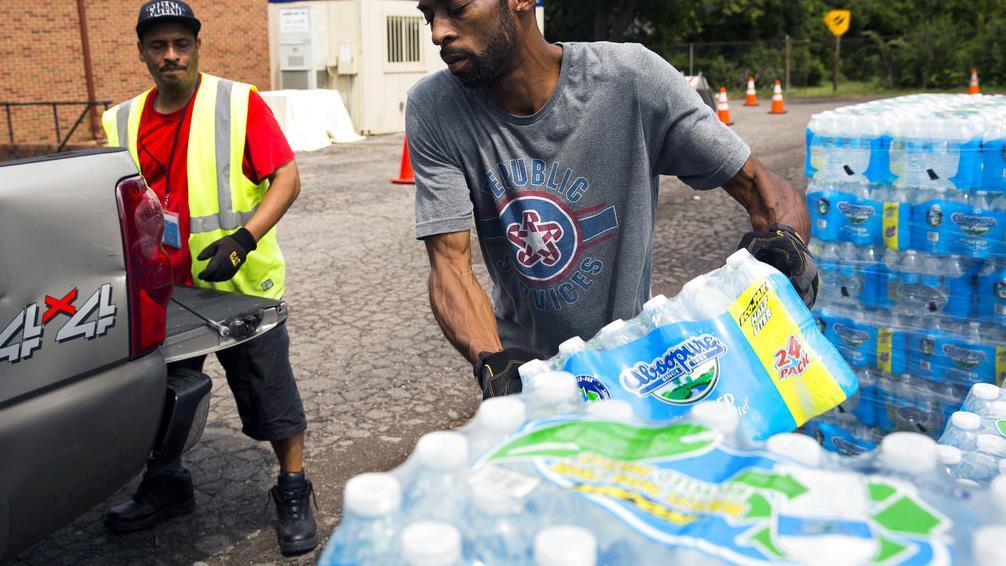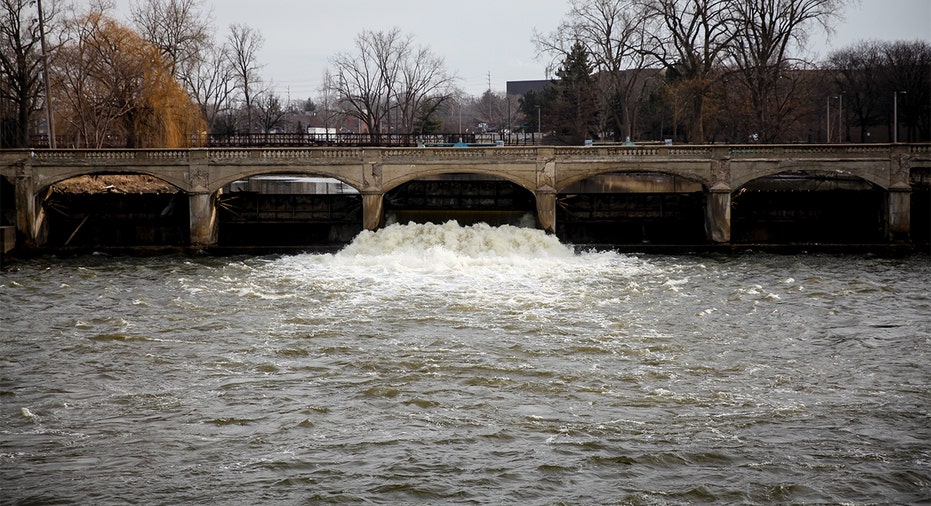Flint water crisis: Democrats debate over the costly infrastructure crisis in Michigan
It’s a crisis that’s lasted longer than five years, and it’s not over yet.
As Michigan took center stage for the second round of Democratic debates, voters in the state wanted answers, asking how candidates would address infrastructure issues to prevent another disaster like the Flint Water Crisis.
"People in Flint, Michigan are still being left behind, still being poisoned by the water in their system," Rep. Tulsi Gabbard, D-Hawaii, exclaimed, noting the money spent to fund the war in Afghanistan.
Sen. Amy Klobuchar of Minnesota noted she had just visited the city, “and they are still drinking bottled water in that town and that is outrageous.”
She explained she’d put $1 trillion to fix crumbling infrastructure, and pay for it by changing the capital gains rate, “by doing something when it comes to that regressive tax bill that left everyone behind.”
Marianne Williamson also tackled the issue, claiming Flint isn’t the only town suffering from infrastructure issues, “Flint is just the tip of the iceberg. I was recently in Denmark, South Carolina where it is -- there is a lot of talk about it being the next Flint.”
By night two, Mayor Bill de Blasio touted his efforts in New York City, talking about how he “declared the eradication of all lead.”
“That needs to be done all over this country.”
Julian Castro, who worked as the Secretary of Housing and Urban Development during the Obama administration, explained “we did what we could to help folks get water filters,” and improved the standard of elevated lead levels in water.
Early estimates put the cost of replacing pipes in the city around $55 million; legal costs to defend lawsuits are expected to reach nearly $10 million.
INITIAL ESTIMATED COST:
$55 MILLION
ESTIMATED LEGAL COSTS TO DEFEND LAWSUITS:
$10 MILLION
APPROXIMATE DONATIONS GIVEN TO HELP:
$33.4 MILLION
EPA FUNDS DEDICATED TO UPGRADES:
$100 MILLION
People are still encouraged to continue drinking bottled water as pipes are still in repair.
It’s unclear exactly how long it will take before construction is complete, though it is expected to take years.
The Flint River is shown on February 7, 2016 in Flint, Michigan. Months ago the city told citizens they could use tap water if they boiled it first, but now say it must be filtered to remove lead. (Photo by Sarah Rice/Getty Images)
Here’s a brief timeline showing how we got here, and where the crisis stands now:
April & May 2014
At the end of April, then-Mayor Dayne Walling turned off the Detroit water feed to Flint. A year prior ago, officials said they would no longer sell water to the city, forcing them to find a new source of drinking water.
Shortly after, residents started complaining about the water, claiming it smelled and tasted bad.
People start buying bottled water instead.
Officials tell residents the water is safe, Walling at the time saying, “It’s a quality, safe product. I think people are wasting their precious money buying bottled water.”
August 2014
Water in Flint tests positive for E. Coli.
February 2015
Local Lee-Anne Walters sent her water for testing.
The results showed water from her home in Flint revealed a lead content of 104 parts per billion.

Flint, Mich., resident Lee-Anne Walters wipes away tears as she and her husband, Dennis, attend a House Oversight and Government Reform Committee hearing in Rayburn Building on the city's water crisis, March 15, 2016. The hearing featured testimony f
The Environmental Protection Agency
September 2015
A research team studying the water releases a study showing the number of children with elevated lead levels in their blood almost doubled after the city switched its water source.

UNITED STATES - FEBRUARY 23: Taylormatthias Wilson-Williams, 2 months, is pictured outside of a water distribution area at the St. Mark Baptist Church in Flint, Mich., February 23, 2016. He was born 12 weeks premature and his mother, Tiantha Williams
In areas with the most severe problems, their lead levels tripled.
October 2015
A public health emergency is declared by Genesee County officials. People are urged to not drink the city’s water until filters are installed and tests are conducted.
December 2016
A team of Virginia scientists link the Legionnaires’ outbreak to the city’s water source: the Flint River.
State officials disagree with the findings though, claiming there needed to be an exact DNA match between the bacteria found in the water and patients.
The CDC later discovered there were in fact genetic links between the water and patients with Legionnaires’ disease.
January 2016
Gov. Rick Snyder declares a state of the emergency hours after the Department of Justice announced they were working with the EPA to investigate the crisis.
Eleven days later, President Obama declares a federal emergency in Flint, freeing up $5 million to help – authorizing the Federal Emergency Management Agency (FEMA) to cover 75% of the costs for upgraded systems associated with filtering water.

According to the 2015 Census Flint Michigan has a population of around 100,000 people with 40.1 percent living below the poverty line, residents of Flint Michigan is now facing a water crisis with high levels of lead found in the water which has affe
Obama denied Gov. Snyder’s request for more money by designating the crisis as a disaster, which would have made more money available more quickly to residents who needed it.
“I’m sorry, and I will fix it … No citizen of this great state should endure this kind of catastrophe. Government failed you – federal, state and local leaders – by breaking the trust you place in us … I’m sorry most of all that I let you all down … You deserve better. You deserve accountability. You deserve to know that the buck stops here with me. Most of all, you deserve to know the truth, and I have a responsibility to tell the truth.”
By the end of the month, Obama promised $80 million in water infrastructure grants to Michigan.
Reports at that time indicated the water system didn’t have lead levels exceeding the federal limit. People were still encouraged to drink bottled water though, due to ongoing mass replacement of pipes that were expected to spike lead levels again.
March 2017
The EPA announces $100 million are being awarded to fund drinking water infrastructure upgrades to Michigan.
April 2019
A judge rules Flint residents can sue the federal government over its handling of the crisis.

Flint residents Gladyes Williamson (C) holds a bottle full of contaminated water, and a clump of her hair, alongside Jessica Owens (R), holding a baby bottle full of contaminated water, during a news conference after attending a House Oversight and G
June 2019
After EPA Director Andrew Wheeler claims Flint water is safe to drink, Mayor Karen Weaver responds, “my feelings regarding if and when I will declare the water safe for residents to drink have not changed.”
“The medical community and scientific community will both have to be in agreement, after a period of testing over time, that the water is safe to drink before I ever declare it safe.”
All pending criminal charges are dropped against officials for their handling of the crisis.
Prosecutors announce they’ll have to start the investigation over from scratch, after discovering the way evidence collection was handled.
Eight open cases were open at the time against officials, including a state health director who was charged with involuntary manslaughter.
CLICK HERE TO GET THE FOX BUSINESS APP
According to the Michigan attorney general, the move won’t impact the seven other officials who previously pleaded guilty to offenses.























